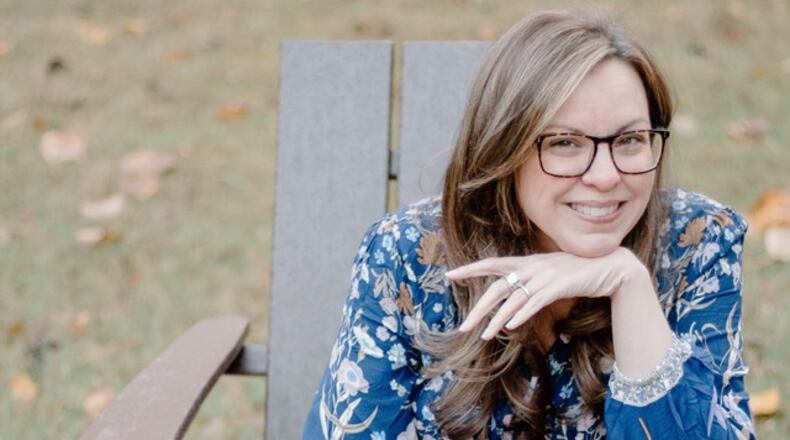Georgia’s low country has acquired a masterful new fabulist.
Kimberly Brock’s sprawling third work of historical fiction earns its evocative title on every page. The marshland, in her hands, fairly thrums with stories that, tended with time and care, add up to heritage.
With writing as lush as that generative pluff mud, Brock, who lives in Atlanta, brings the sepia-toned past to vivid life. In her latest, she leaps back and forth through time, limning the inner worlds of three remarkable, resilient women and their interconnectedness. A spirit of gentle, unassuming feminism animates the plot, with male characters orbiting around them, moons to their Earth — their fabled earth.
The book opens in 1959 when Cleo Woodbine, a hardy, middle-aged artist who lives alone on Kingdom Come, a sand-spit just off Cumberland Island, receives an obituary in the mail. Regarded by the mainlanders as a crotchety recluse — kids taunt her with animal pelts — she clearly has been transfigured by events that remain a mystery until the narrative’s denouement. In the course of her personal journey to reconcile old wrongs, she encounters Frances Flood, a folklorist seeking clarity on her family, and Audrey Howell, a young, widowed innkeeper. Their viewpoints alternate with the artist’s experiences in 1932, when a fateful night of storytelling around a bonfire resulted in two drownings. Tall tales come with consequences, it turns out, but in the right hands, they can also heal old wounds.
“Fires set stories free on the world,” Cleo muses. “That’s what stories like best. And every one of us has a library we’re carrying around right inside us. … Did you know, that’s why all stories are ghost stories? They’re our ghosts and we give them life to walk this earth and keep us company.”
Brock builds suspense with featherlight foreshadowing, but her work does not invite speed-reading. She writes old-fashioned novels, dense as a good pound cake, to be savored before the page is turned. They are indelibly Southern without being Gothic — her eccentrics do not rise to the hysteric level of Flannery O’Connor’s cunning, wild-eyed freaks. Instead, they are purposeful personalities who manage to live the best they can on their own terms despite the constraints of their environment, which is still haunted by the glamorous but fading excesses of the Gilded Age.
Credit: Harper Muse
Credit: Harper Muse
This novel, like its well-received predecessor, “The Lost Book of Eleanor Dare,” explores prejudice and social tensions, including the fraught integration of a movie theater. And a Cherokee war veteran manages to rile some of the locals — and inspire others — with his social-justice activism. Lumas Gray, a bookish, young Black man, is compelling enough to warrant more attention, but the story belongs to the women.
There are glints here and there of lust — someone ends up pregnant outside of wedlock, a development greeted with surprising, shrugging equanimity — and there is sex, rendered ever so obliquely. Brock seems so respectful of her characters that she is not one to leer through peepholes. So no bodices get ripped. Her specialty is warmth, not heat.
As if draping a Live Oak with Spanish moss, Brock’s lyricism gins up some heady atmosphere. “The Fabled Earth” offers plenty of delectable, mythical details — folk magic, a crumbling Carnegie mansion, a yowling bobcat to symbolize the wilderness and a river siren or two, who may or may not be real.
In an echo of the drug in Ann Patchett’s “Commonwealth,” a seductively witchy potion made of crushed morning glory seeds plays a role in altering the course of more than one life. “Add that to your drink for colorful thoughts, more for walking dreams, a lot more for no dreams at all,” goes its legend.
Brock has demonstrated a canny, out-of-the-mouths-of-babes knack for portraying gimlet-eyed children. This novel’s imp is Jimmy Walker, a 12-year-old cinephile who smiles a “twinkly-eyed, gap-toothed grin. Jimmy didn’t attend school and spent most of his time at the movie theater. He was young for his age — some might call him simpleminded — but he could quote films at the drop of a hat.”
All of these characters make for good company. They are easy to root for. Even Jimmy’s bigoted hothead father — as close to a villain as this book gets — attains some redemption by the end. A through-line in Brock’s oeuvre is community building. Desiring that everyone get along, experience love and pardon each other’s mistakes, she is nothing if not magnanimous. A stalwart loner like Cleo Woodbine still needs someone to listen to her parables, and, happily enough, she finds him.
So perhaps it is not surprising that Brock, when she is not writing award-winning historical fiction, is nurturing fellow scribblers. She is the founder of Tinderbox Writers Workshop and has served as a guest lecturer for many regional and national writing workshops, including the Pat Conroy Literary Center.
“Here was further proof,” she writes, “that a story could start in one place and end in another in unpredictable ways. You could be a silly girl and grow into a woman who turned a house into a home, a lonely fisherman into a father, a fable into forgiveness.”
AUTHOR EVENT
“The Fabled Earth.” Author Kimberly Brock will be in conversation with Lynn Cullen, author of “The Woman With the Cure,” 7 p.m. Oct. 27. $12. History Center Midtown Campus (Margaret Mitchell House), 979 Crescent Ave., Atlanta. 404-814-4000, atlantahistorycenter.com
FICTION
“The Fabled Earth”
by Kimberly Brock
Harper Muse
400 pages, $28.99
About the Author
Keep Reading
The Latest
Featured



